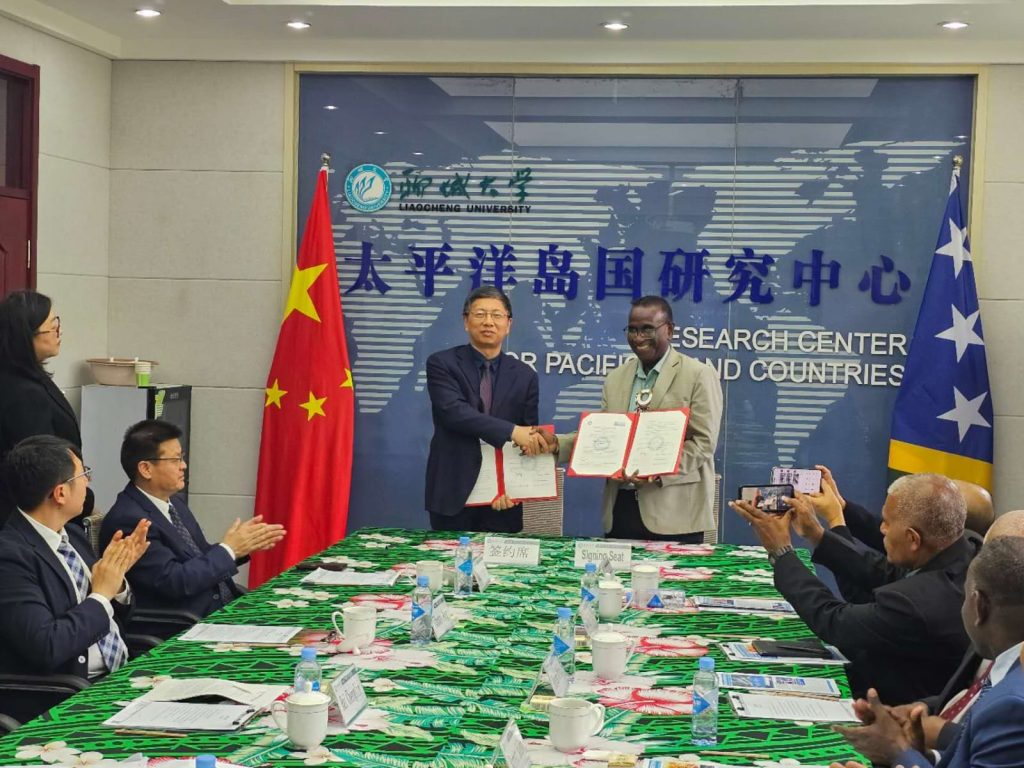𝐏𝐫𝐞𝐬𝐬 𝐑𝐞𝐥𝐞𝐚𝐬𝐞
𝟐𝟕 𝐀𝐩𝐫𝐢𝐥 𝟐𝟎𝟐𝟓

Photo Caption: Professor Transform Aqorau, Vice Chancellor of Solomon Islands National University (SINU), and Professor Bai Chenglin, President of Liaocheng University, pose for a photo after successfully signing the MoU.
In a historic ceremony underscoring the deepening bilateral relations between Solomon Islands and China, Professor Transform Aqorau, Vice Chancellor of Solomon Islands National University (SINU), and Professor Bai Chenglin, President of Liaocheng University, formally signed a Memorandum of Understanding (MoU) on 26 April 2025. The agreement, witnessed by His Excellency Barrett Salato, Ambassador of Solomon Islands to China, and academic leaders from both institutions, establishes a comprehensive partnership to advance cultural exchange, collaborative research, and innovation-driven education.
The MoU marks a significant milestone in fostering international academic cooperation, with a focus on addressing shared challenges such as climate change, sustainable development, and human resource capacity-building. By aligning SINU’s national development priorities with Liaocheng University’s expertise in applied research and industry-academia collaboration, the partnership aims to empower students, researchers, and communities across the Pacific.
The agreement outlines cooperation across four key areas: cultural and language exchange, joint research initiatives, personnel exchanges, and academic resource sharing. These efforts will prioritize sectors vital to Solomon Islands’ development, including agriculture, fisheries, tourism, and climate resilience. The MoU, effective for an initial five-year period with provisions for renewal, reflects a shared vision to bridge academic excellence with practical solutions.
Ambassador Barrett Salato emphasized the strategic importance of the partnership, framing it within the broader context of China’s transformative development journey. “China’s unparalleled success in lifting over 800 million people out of poverty within a single generation stands as a global benchmark for inclusive growth,” he stated. “This MoU is more than an academic accord—it is a conduit for transferring the knowledge, policies, and technological innovations that propelled China’s rise. For Solomon Islands, where nearly 25% of our population still lives below the poverty line, such collaboration is vital. By fostering entrepreneurship, vocational training, and skills in sectors like agriculture, fisheries, and green technology, we are equipping our youth to drive sustainable growth and self-reliance.”
He further highlighted China’s Belt and Road Initiative (BRI) as a cornerstone of equitable global development. “Through the BRI, China has demonstrated its commitment to empowering small island nations by investing in infrastructure, capacity-building, and climate resilience. This MoU extends that vision into academia, ensuring our students and researchers gain access to cutting-edge technologies and methodologies. Crucially, this partnership reaffirms Solomon Islands’ unwavering adherence to the One-China Principle, which underpins our diplomatic relations and mutual trust. Together, we are not only sharing resources but also aligning our aspirations for a stable, prosperous future.”
Professor Transform Aqorau underscored the transformative potential of the agreement, positioning it as a catalyst for redefining higher education’s role in national development. “This partnership transcends traditional academic boundaries by merging classroom learning with real-world industry demands,” he explained. “Liaocheng University’s model—where students engage in internships with local enterprises, participate in innovation incubators, and collaborate on applied research—has already produced graduates who lead thriving businesses in sectors from logistics to renewable energy. By adopting this approach, SINU aims to nurture a generation of innovators who are not just job seekers but job creators, particularly in Solomon Islands’ priority sectors like marine resource management and eco-tourism.”
He detailed how the partnership would address pressing national challenges through targeted research. “Our focus on marine science and climate adaptation is not academic abstraction—it is survival. Rising sea levels, coral bleaching, and overfishing threaten the livelihoods of our coastal communities. Through joint research with Liaocheng University on sustainable aquaculture, low-carbon fisheries, and habitat restoration, we are equipping Solomon Islanders with tools to safeguard their environment while boosting food security. This collaboration also bridges traditional knowledge—such as indigenous marine stewardship practices—with global scientific advancements, ensuring our solutions are both culturally grounded and technologically robust.”
Professor Aqorau concluded with a vision of reciprocity. “Just as we learn from China’s expertise in green infrastructure and vocational training, we bring to the table our deep understanding of Pacific ecosystems and community-centric development. This exchange enriches both nations, proving that true partnership is not about dependency, but mutual empowerment.”
Professor Bai Chenglin highlighted Liaocheng University’s enthusiasm for the collaboration, noting, “Our university’s strength lies in blending Shandong’s rich cultural heritage with modern innovation. Through this MoU, we look forward to sharing our experience in vocational training, applied research, and entrepreneurship programs with SINU. This partnership is not just an exchange of resources—it is a fusion of visions that will yield tangible benefits for both nations.”
The MoU builds on SINU’s existing partnerships with Chinese institutions, including the Oceans University of China, which will co-establish a Mariculture and Aquaculture Research Centre in Isabel Province. The new agreement with Liaocheng University further enhances opportunities for student-led innovation, vocational training, and technology transfer. Key initiatives include entrepreneurship incubators, joint research on low-carbon aquaculture systems, and academic exchanges to strengthen expertise in marine biosecurity and environmental management.
Ambassador Salato highlighted the transformative impact of practical education by citing the remarkable journey of a Liaocheng University alumnus whose entrepreneurial venture has become a beacon of innovation. After graduating with a focus on logistics and technology, the alumnus established a pioneering logistics company that has rapidly expanded across multiple provinces in China. Today, the company is venturing into China’s cutting-edge “low-altitude economy” sector—a burgeoning field focused on drone-based delivery systems, aerial logistics, and advanced transportation technologies. Ambassador Salato underscored this achievement as a direct outcome of Liaocheng University’s emphasis on industry-aligned curricula, hands-on vocational training, and student entrepreneurship programs, such as its innovation incubators and startup competitions.
“This success story exemplifies how equipping students with real-world skills and entrepreneurial mindsets can catalyze economic transformation,” Ambassador Salato remarked. “For Solomon Islands, where sectors like fisheries, aquaculture, and marine conservation are pillars of our blue economy, integrating similar practical training into our academic programs is essential. By embedding internships, applied research, and partnerships with industries like agriculture and logistics into SINU’s curriculum, we aim to empower our graduates not only to seek employment but to create jobs, drive sustainable enterprises, and contribute to national priorities such as food security and climate resilience.”
He further emphasized that the MoU with Liaocheng University would enable SINU to adopt best practices in bridging academia and industry, ensuring Solomon Islands’ youth are prepared to harness emerging opportunities in both traditional sectors and innovative fields like green technology and marine spatial planning. “Just as this graduate’s company thrives by adapting to technological advancements, we envision our students leading the charge in building a resilient, diversified economy rooted in our ocean resources and global partnerships,” he added.
The signing of the MoU marks a symbolic milestone, coinciding with the fifth anniversary of diplomatic relations between China and Solomon Islands—a period characterized by deepening trust, expanded cooperation, and shared ambitions for sustainable development. Reflecting on the progress since 2019, Ambassador Salato noted that bilateral ties have flourished across trade, infrastructure, and education, with China emerging as a pivotal partner in Solomon Islands’ national development strategy. Professor Aqorau underscored the MoU’s role in decentralizing opportunity and ensuring equitable growth: “By anchoring partnerships in provinces like Isabel, where communities depend heavily on marine resources, we ensure that innovation and capacity-building reach those who need it most. This collaboration exemplifies how Pacific nations can leverage global alliances to address hyper-local challenges—such as coastal erosion or sustainable fisheries—while contributing valuable insights to global scientific discourse on climate resilience and ocean health.”
As part of their reinforced commitment, both universities affirmed plans to establish a Confucius Institute at SINU, which will serve as a hub for Chinese language education, cultural exchange, and interdisciplinary research on Sino-Pacific heritage. The Institute will offer tailored programs in Mandarin proficiency, traditional arts, and collaborative studies on Solomon Islands’ cultural ties with Shandong Province, renowned for its Confucian heritage. Additionally, the partnership will prioritize co-supervised research projects between SINU and Liaocheng University faculty, focusing on climate-smart agriculture, marine biotechnology, and renewable energy systems tailored to island ecosystems. These initiatives will be complemented by joint publications, shared access to research databases, and annual symposia to showcase findings. “The Confucius Institute will not only deepen cultural understanding but also create pathways for our students to engage in China’s academic and economic landscape,” Professor Aqorau added. “Meanwhile, co-supervised research ensures that Solomon Islands’ unique environmental challenges are addressed through globally informed, locally grounded solutions.”
END/////////
